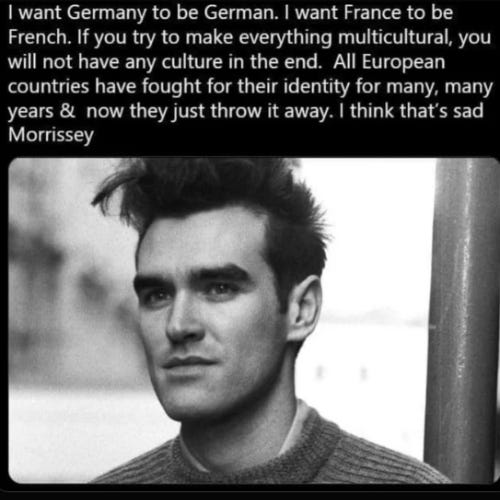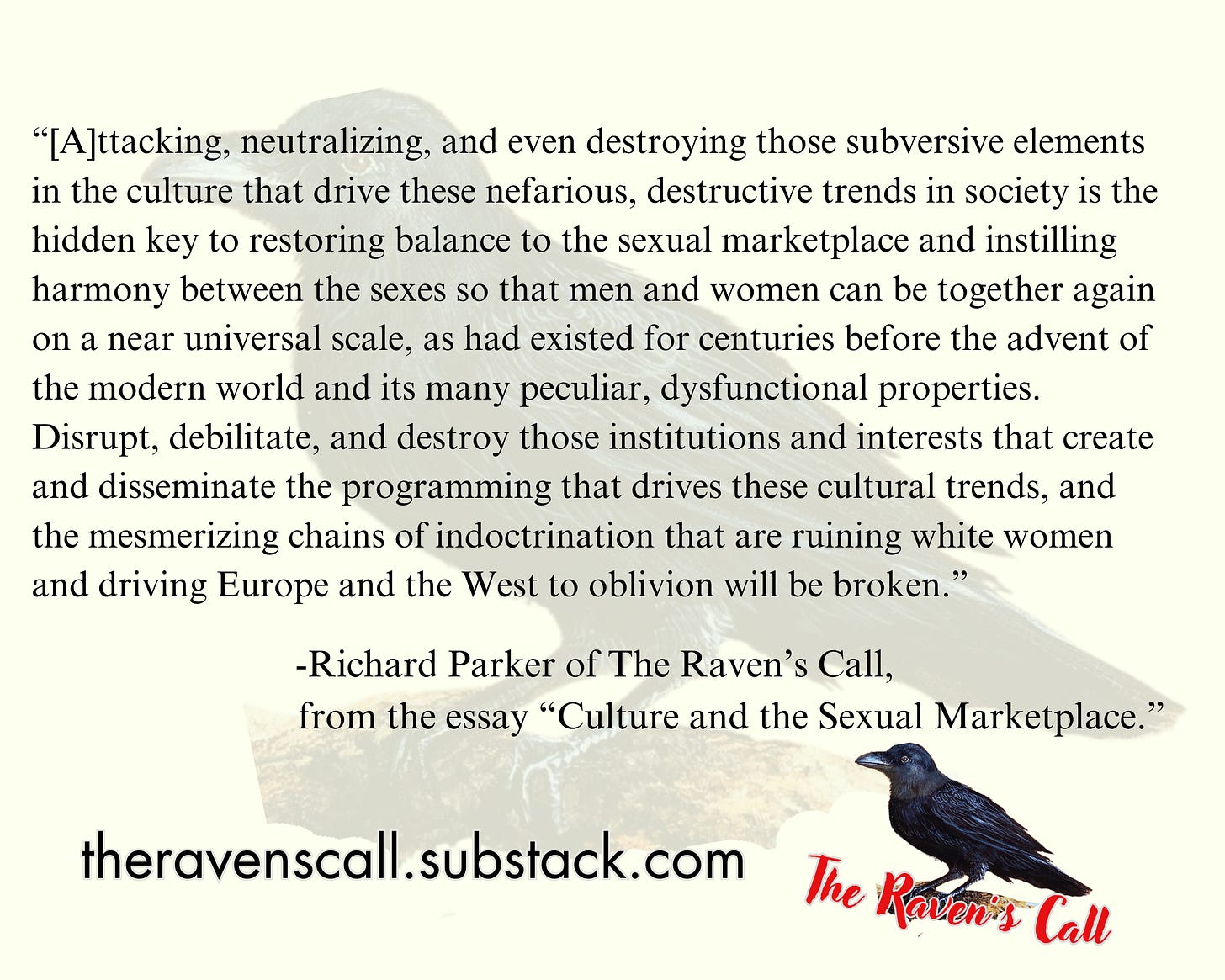Leftist Indoctrination, Family Betrayal, and a Book Deal
A Summary and Analysis of Leonie Plaar’s Meine Familie, die AfD, und Ich

A Concise Summary of Leonie Plaar, Her Family, Her Politics, and This Book
Leonie Plaar, better known as Frau Löwenherz, is a radical left influencer in Germany, whose public personage can be best described as lesbian, antifa, and an adamant proponent for the effort to ban Alternative für Deutschland (AfD). Lamentably, Plaar has some degree of influence, with over 131 thousand followers on her German language TikTok account and over half a million followers on her English language account. She has a somewhat more modest presence on Instagram, with a German language account of approximately 80 thousand followers (it has recently dipped below 80k), and over 30 thousand followers on an English language account.1 She has appeared on various talk show segments on German television, although not without controversy and ridicule. Perhaps worst of all, she was recently given a book deal by Goldmann Verlag and Penguin Deutschland, as Meine Familie, die AFD, und Ich (My Family, the AfD, and I) was published last month, September 2025. This contemptible screed, which recounts her decision to break off contact with her family, her father in particular, is the focus of this essay, with an in-depth summary and analysis set forth below.

Those who have followed Plaar knew about this decision for some time; she even talked about it on during a presentation sponsored by TINCON, an organization geared towards indoctrinating German youth with far-left claptrap. Disparaging her family, particularly her father, in such a manner was not enough, as she has now capitalized on this with this book. It is currently a Der Spiegel bestseller, but, as is the case with The New York Times bestseller list, there is reason to doubt the veracity of such numbers. German contacts have informed this author that the Der Spiegel bestseller list is even more dubious than its New York Times counterpart. The implication of this is that her book may not be nearly as wide read as feared. Even granting such suspicions their due, some at least are reading this screed, just as at least some of the 80ish thousand followers on Instagram have to be real, to say nothing of the half million on TikTok.2 It is for this reason that cultural and political expressions such as those by Plaar require the strict attention and scrutiny of those who oppose such ruinous politics and ideology.
Both the subject matter as well as the writing style, which includes more than just a few forays into excessive Anglicisms, render the reading of this book a most unenviable task indeed—the last two words of the book are the English phrase “quite happy.” As to be expected from leftist ideologues like Plaar, her writing also engages in an insidious practice known in current-day Germany as Gendern. Regarded by its proponents as the newest iteration of geschlechtergerechte Sprache,3 this practice eschews using nouns referring to persons in their traditional, gendered forms. For example, rather than using die Lehrer (“teachers” with a generic masculine form). this affliction on the German language, known as the Gendersternchen, denotes “teachers” with the abomination “die Lehrer*innen,” using the plural feminine form of the noun for teacher (die Lehrerin and die Lehrerinnen) but with an apostrophe between the root noun and the feminine suffix to placate so-called “non-binary” people. Rather than AfD Wähler, Plaar constantly refers to AfD supporters or AfD constituents as AfD Wähler*innen.
In terms of offering new content and fresh ideas, the book’s only substantive value was the added details of her family and her decision to break off all contact with her father in particular; it seems she has very sporadic contact with her mother. At less than 200 pages, the thin volume provides a family and personal history combined with her zealous advocacy for her decision to cut ties with her family. This account of the events that led to this decision are interspersed with various political diatribes that could not be any more unoriginal or uninteresting. That portion of the text not dealing with her family reads like a barely coherent mish-mash of leftist catechisms. Although there are a few, occasional Schachtelsätze4 that require close attention by non-native and probably native German speakers alike, the greatest peril faced by this reader was the challenge to stay focused when reading passages that were nothing other than naked boilerplate of leftist dogma that has been encountered countless times before. This includes several pages devoted to Kimberlé Crenshaw’s cursed diatribe about intersectionality as well as other leftist tenets that have been repeated and regurgitated countless times before, not unlike religious catechisms. The text is also riddled with tired, cliched jargon that has become all too predictable, including the unironic, sincere use of the term “fact checks,” “toxic masculinity,” so-called “white privilege”—in sacred Germany!—and a limited selection of other buzzwords and slogans revealing how very shallow the NPC script runs.
As discussed below, various redundancies, the constant, unremittent use of a few select adjectives and other buzzwords, as well as the dearth of original, novel content inform more discerning readers that this book deal was not founded on any objective appraisal based on quality of writing or interesting, unique insight, but simply having a minimum, baseline number of followers on TikTok or other social media platforms. Such are the literary standards of major publishing houses in the modern world, if one can call them standards at all.
It is of particular note that Plaar commits a fair amount of verbiage condemning so-called “white privilege,” including expressions of naked contempt for her father for having such supposed privilege. Reading leftist claptrap droning on—and on—about so-called “white privilege,” so painfully familiar in modern American discourse, is particularly grating in the German language and in the context of the plight of modern Germany precisely because Germans, actual Germans and other actual Europeans who have a right to live there and travel there, are categorically white by definition. The “privileges” enjoyed by her father, other Germans, and even herself, for which she also expends significant verbiage to apologize for, are nothing less than belonging to a homogenous, European society and enjoying the benefits and advantages of the social contract such society is supposed to provide for those who rightfully belong to that society and polity. Such tirades are revealed to be particularly absurd and offensive when one imagines the same vitriol applied to Japanese individuals enjoying Japanese or “Asian privilege” and other advantages of belonging to Japanese society, or “Jewish privilege” in the context of Israeli Jews belonging to Israeli society.
Increasing Acrimony With Her Family and the Decision to Break Off All Contact
Interspersed with these and other boilerplate leftist talking-points is a narrative that sets forth both the events that preceded and then compelled (in her mind) her decision to cut off contact from her family and her justification for doing so. Perhaps the most repugnant facet of this book is the raw, naked contempt she holds for her father. She does not even refer to him as her father, but uses the German word “Erzeuger” to refer to the unfortunate patriarch. As is often the case with many German words and expressions, the word defies easy translation. In relation to animal husbandry, the term can be translated as “breeder.” In matters of law and in other contexts where a man impregnated a woman who gave birth to a child but was never active in a role as a father, the term can also be translated as “biological father.” However, the term “biological father” would make little sense to English readers in Plaar’s particular instance given the absence of any context in which it is normally applied. Given that Leonie was never adopted or raised by a step-father, use of the term “Erzeuger” is therefore both strange and dehumanizing. It is of note she refers to her mother, grandmother, and late grandfather as such: Mutter, Oma, Opa. In the course of this text, she also refers to him as a “textbook example of frustrated facebook boomers,” a “complete asshole,” and an “old white man.”
The factual context underlying her strong political disagreements with her father and the rest of the Plaar family is fairly straightforward and could have been summarized in a medium-length essay. She attended the Universität Osnabrück with the original intention to major in law (the rough equivalent of law degrees are awarded at the undergraduate level in Germany). At some point she changed her mind and switched to history and gender studies. Predictably enough, this coincided with her abrupt political radicalization. During this time, she would visit family armed with “anti-racist” and “feminist” literature with the fool’s errand of trying to change their minds. She could not. Utterly uncompromising in her political convictions, she could not accept that her parents and grandparents supported the supposedly “far-right” AfD. Both her contempt for her family and her rigid, unwavering ideological zealotry even obliged her to start an argument at her family’s traditional German Christmas celebration5, even though she was sure it would be the last such get together for her late grandfather. The continuing political disagreements only ratcheted up with increasing intensity, before finally coming to a head when she came to what would be her last visit with her family, armed with what she thought was a silver bullet, namely the question “what circumstances would oblige you to leave the AfD?”
Here there is an important discrepancy with what is set forth in the book and what she relays in the TINCON pr sensation alluded to earlier, as well as, in all likelihood, other appearances and statements concerning this subject. In the presentation in Cologne, which, of course, occurred before this book was published or even in the process of writing and revision, she claims that her father answered that “nothing” could persuade him to leave the AfD. The underlying reason as to why this would be unforgiveable is that her father would still not leave the party even if the AfD somehow transformed itself to an actual far-right, neo-Nazi party that condoned the Holocaust or took other positions that the party would never do both for practical political reasons and because such positions would render the party illegal in modern Germany still underfoot of her American conquerors. In the book, this line of “argumentation” was underpinned by the fantastical rhetorical question as to what her father’s reaction would be if Björn Höcke did a Nazi salute in the Bundestag.6
Here however Plaar is either caught in a lie or suffers from an acute inability to keep her facts straight. In the book, she recounts this challenge but states that his original response was, after staring off in the distance and taking a deep breath, to simply say nothing. She then reiterated the same question in so many words and hysterical rhetorical questions with no basis in reality, and he simply stated that supporting the AfD is in his best financial interest. This is in direct contradiction of her earlier account at TINCON where she claims he said “nothing” would change his mind concerning the AfD.
It is of note that right-of-center outlets have discovered and commented on an equally if not more disconcerting inconsistency, namely that she claims to have been briefly a member of the AfD at different ages, both of which would have her, a woman born in 1992, as a member of the party before it was founded in February of 2013. In the book she claims she was 19, and in other public statements it was 18. As at least one German influencer has noted, it would be interesting if the AfD made a public statement certifying that she was never in fact a member.
It is also of note that Plaar identifies a different moment that obliged her, in her mind, to end her relationship with her father in particular. In the book, she recounts a disagreement concerning Covid policy and mandatory vaccinations as the final straw. In denouncing the naked overreach by the Bundresrepublik, her father is alleged to have invoked comparisons to the Holocaust, even alleged to have uttered the derisive comment “Impfung macht frei” (vaccinations will set you free), an allusion to the “Arbeit Macht Frei” sign at the gates of Auschwitz. For Leonie, this “crossed a red line” that could not be forgiven. In the TINCON presentation, she at first desginates the response to her question “What would oblige you to no longer support the AfD” as the reason for breaking off contact, before then explaining that maintaining a relationship with her father in particular would present a danger to her “queer, nonbinary, and BIPOC friends.” At the end before the question-and-answer session, she notes that he compared vaccination requirements with the Holocaust, but did not say this was what crossed the red line, as set forth in the book.7
Given what could most charitably be described as inconsistent statements at best, and at worst what some reasonably suspect to be outright lies, there is more than enough reason for critical readers to doubt he made such utterances at all. Even accepting this as fact, it smacks of obvious hyperbole, exaggerating for rhetorical effect legitimate fears of government overreach in Germany in relation to Covid measures and the vaccine mandates in particular.8 Reading her account of events as she alleges to have taken place, this reader was not left with the impression that the father seriously believed the Bundesrepublik was going to round-up dissidents who resisted such Covid policies and put them in concentration camps, earmarked for extermination.
Consider yet another inconsistency. During the presentation in Cologne, she asks the audience if any in attendance were a “Papakind,” roughly meaning “daddy’s favorite.” In that presentation, she describes her relation with her father being special, and even recounted how in her childhood and adolescence he would regularly come up to her room before bedtime to discuss current events, how her day went, how his day went, and other matters. In the book however, she alleged that her deceased older brother, Gerrit, was the favorite, and that she received unequal or disparate treatment compared to her brother. She even takes umbrage with how he expressed grief when meeting her at the hospital upon news of his death for reasons that were mystifying to this author as well as at least one native German speaker who read the salient passage in question.
As an aside, in a concluding chapter, she divulges to the reader that there are other reasons besides the political and ideological differences that bolstered her decision to end contact with her father in particular. This should strike readers as the most underhanded of all. An author who decides to disparage her father with the intent to convince the reading public of the correctness of such a decision, having decided to make the matter public, should state all relevant contentions plainly and openly. This does not mean all details must be divulged, but this particular tactic is particularly low, even for Plaar. Note also such suggestions necessarily convey certain dark implications, that readers sympathetic to Plaar might infer such nebulous implications likely pertain to physical or sexual abuse or the like.
Another detail in an early chapter further invites skepticism, namely her account of what quickly disabused her supposed (and very brief) membership in the AfD. She claims a black woman “Ella” contacted her on Facebook to express her objections and concerns about AfD and how the party harms “marginalized” people and groups. Consider the possibility, likelihood even, that Ella is a lie and fabrication to draw on the rhetorical weight lefties afford the “progressive stack.” Plaar’s intentions could not be more transparent, namely to show deference to “marginalized” voices and how she as a “privileged, cisgender white woman” in Germany listens and defers to black and brown voices. However ridiculous and disdainful such rhetoric is, it carries significant currency in leftist circles.
The Regurgitation of Leftist Catechisms as Political Diatribe
As stated, the political diatribes are nothing less than a recitation of leftist catechisms, seemingly regurgitated verbatim, with no original thought or insight whatsoever. Reading these portions of the text nonetheless reveals several key attributes that characterize not just Plaar but many of her ilk. One of the most immediate propensities that jumps out at the reader is the constant repeating of certain adjectives to describe persons and entities she not only disagrees with but disdains, those figures being, aside from her poor father, the AfD, its supporters, and most immediately its key leaders. She constantly describes both the AfD and its supporters as “right-wing” or “far-right;” the German word is “rechtsextrem,” which literally translates as “right extreme.” “Rechtsradikal” is a similar adjective, but one she uses much less. So much of the prose is just utterly and appallingly redundant, simply stating over and over “The AfD is far-right” over and over again. At one point, after some variation of that sentence had already been uttered in some variation countless times before, she reiterates: “Once again—the AfD is a far-right party.” This not only reveals a defect in reasoning9 and dearth in substance, it reveals her writing to suffer from some of the worst offenses against basic principles in writing and expository composition; first, avoid excessive redundancies and, second, avoid overuse of the same adjectives and other words over and over.


As do others in Germany’s left, she also denounces the AfD and its supporters as “misanthropic.” This is another instance where something is lost in translation, because the word “menschenfeindlich” denotes something more sinister in the German, as it literally means “hostile to humanity” or an “enemy to humanity.”10 This term is interspersed with the word menschenverachtend which also means misanthropic but can also mean inhumane, as it literally translates as “contemptuous of humanity.” These and other select adjectives are repeated as if uttered as a rote mantra or, as previously stated, catechism.
Of course, it is not at all the case that the AfD or other right-wing parties and movements, regardless of how moderate they are in fact, are actually misanthropic or contemptuous of humanity, at least not all of humanity. At the very least, AfD supporters and those who demand sensible immigration policy, protection of borders, as well as remigration are not contemptuous of all of humanity at all, as they love their nation and their people, and seek, desire, and demand policies that are conducive to the preservation and furtherance of their future posterity. Morrissey, former frontman of the Smiths, and others have noted how those who truly respect both humanity and diversity in humanity understand why European nation states must remain homogenous, that the multiracial vision of globalism seeks to destroy those differences. Leonie Plaar on the other hand is contemptuous of one segment of humanity, that is Germans in particular, first and foremost her own father, and Germans and white Europeans writ large, especially men.
The rhetorical or, for lack of a better term, literary ticks whereby she is compelled to recite the same adjective and other buzzwords countless times, over and over, is perhaps most evident in relation to Björn Höcke. With few very exceptions, she could not mention the name of this man without the seemingly obligatory preamble of “fascist” first, e.g. “Fascist Björn Höcke” or on rare occasion “the fascist Höcke.” “Der Fascist Björn Höcke” or some slight variation thereof was repeated over and over, as another mantra of the leftist hive mind.
An examination of this book as extended political diatribe also reveals other important propensities. Plaar, like so many other leftist swine of her ilk, never really refutes the contentions of her political enemies, namely her own family, in any given instance. Both in relation to the disastrous Covid policy and the supposed threat to “our democracy” she and others imagined the AfD to be, many of her supposed refutations are nothing other than naked appeal to authority. In relation to the concerns by her family and others concerning the Covid pandemic and the heavy-handed, destructive measures imposed in response to it, she simply cites that there is a “scientific consensus,” which in her mind ends and wins the argument.11 Ostensibly this is also true in the minds of many readers who took up the volume for purposes very different than writing this summary and analysis. COVID policy however is not the only issue where she employs this specious rhetorical tactic. To conclude an exhaustive chapter attacking the AfD as a threat to democracy where she reiterates “rechtsextrem” countless times over, she concludes by noting how “experts warn” that the AfD is a threat to democracy. This reveals a particularly faulty line of “reasoning” that combines circular logic with a most specious appeal to authority; X is Y because X is Y and because “experts” warn that X is Y.

Another rhetorical propensity is to repeatedly describe both platform issues embraced by the AfD and its appointed leaders as well as grievances expressed by her estranged family members as nothing other than conspiracy theories. This is applied to topics on which reasonable minds can disagree, including the suggestion that the vaccine mandates are part of an intentional bid to accelerate and exacerbate white infertility (an assertion of which this author remains unconvinced, although given Plaar’s poor credibility one doubts her family members actually uttered such things) to the great ethnic and racial replacement that has overtaken Europe and the West, a phenomenon so corroborated by hard data as to be indisputable.
The key to understanding how thoroughly engrained her indoctrination is perhaps lies in the fourth chapter, “You Must Also Accept Different Opinions.” This chapter purports to address an objection raised by her grandmother in which the matriarch admonished the younger Plaar that she must learn to accept opinions that are different from her own. In this section, but in preceding and subsequent passages as well, Plaar describes what to her are various disagreeable contentions (no doubt at times consisting of straw-man arguments). Then, as rebuttal of this argument, Plaar simply asserts, with little to no analysis or factual basis, that the argument or facts asserted are simply not true. In a crucial excerpt of this pivotal chapter, she incredulously contends that a right to have an opinion is conditioned on being based on facts, with Plaar and her various political and ideological allies as the sole, exclusive arbiters of what is fact and what is not. Conversely, an opinion based on what she contends are counterfactual assessments are not opinions, but “false claims” (“falsche Behauptungen”). Time and time again she simply states that the claims asserted by her family and other ideological and political enemies of her insane, civilization-destroying worldview are just wrong—or rather that the factual matters underlying these claims are wrong—without proof or actual argumentation. Consider the claim that allowing biological men into female spaces harms women, a claim which has now been proven in many different countries and contexts that have succumbed however briefly to transgender nuttery and delusion. She simply writes “Spoiler—that’s not true.”12
A close reading of this portion of the text reveals that the author soon engages in the old switcheroo. Namely, at first she discounts or dismisses the assertions and arguments of her political enemies by simply declaring they have no factual basis or dismissing them as outright “lies.” As stated before, this is usually done either by that declaration alone or a summary appeal to some nebulous authority such as “scientific consensus” or “experts.” At the end of this diatribe constructed on such bizarre, faulty reasoning, she shifts from the blithe assertion that right-wing views lack a factual basis to declaring outright refusal to compromise on what she wrongly believes to be morally righteous positions on these issues:
Particularly in relation to personal discussions with AfD supporters… it is not a matter of difference of opinion, but rather moral values. Breaking off contact with my family arose not from difference of opinion, but rather that their assertions were not compatible with my comparatively strict moral system.
This is one of the very few considerations she gets right, namely that these irreconcilable differences do stem from moral convictions, even though she is utterly wrong about her moral convictions. In any case, this rare moment of insight should have dispensed with the ridiculous blather alleging there is no factual basis for right-wing reactionary views.
Her specious, faulty reasoning is revealed in many other facets as well. Her parents and other family members, quite correctly, expressed concerns about the danger migrant males pose to the female population of Germany and other countries. Plaar does not engage in any statistical analysis debunking such claims (such data does not exist). Her argument, if one can call it that, is that any sexual assault she ever experienced was at the hands of “white Germans,” ie actual Germans who have a natural blood right to live and reside in sacred Germany! This argument was tethered to a dubious claim that she was raped or sexually assaulted (vergewaltigt) at 17—skeptical readers rightly suspect it was simply a consensual sexual encounter she soon regretted thereafter, and certainly was nothing like the violent sexual assaults that have been perpetrated by migrant, black and brown males in Germany and elsewhere. She further claims that the problem of sexual violence against women “has nothing to do with migration, but rather toxic masculinity.” Then there is this bit of misandrist prattle, dripping with her abject contempt and disdain for men of her own people, as expressed to her father during one of their arguments:
Do you know how often I have been harassed or groped at parties by certain types of men? And each of them was a white German. Every time, when I turn around because there is a strange hand on my ass, stands some Markus or Stefan or Christian in a preppy polo and chinos who thinks I should take that as a compliment.
Here and elsewhere Plaar and others of her loathsome persuasion conflate simple groping or what are ultimately unsuccessful sexual advances at social functions with the sort of brutal, violent rape that have been afflicted on the native populations of Europe by racial imposters who simply must be expelled and expunged from the European continent. The “reasoning” could not be more faulty; Plaar incredulously asserts that because she and those in her circle have never been victimized by migrants or other imposters, and because all of her negative experiences have been at the hands of her German male counterparts, the concern is therefore, in her twisted, delusional mind, invalid.
She also disparages both her family members and AfD supporters by citing alleged death threats and rape threats and then impute these isolated statements in comments sections, direct messages, and the like as representative of her detractors not only collectively but to each and every detractor. Such utterances are of course probably more aptly described as wishes for harm than actual threats. If one were to use this logic, the entire constituency of the Democrat party in the United States would be condemned by similar imputation of unsavory comments about the assassination of Charlie Kirk or the attempted assassination attempts on President Trump’s life during the 2024 election. It is of note she used that rhetorical tactic specifically to denounce her family in her insistence that they stop supporting the AfD; some who claim to support the AfD have expressed a desire to see her raped or killed, so, in Leonie Plaar’s mind, failure to denounce the AfD is somehow tantamount to tacit approval of such comments. One of her outrageous tirades against her father is recounted as follows:
You at the very least know what this party wants. A party composed of a certain contingent of people and supported by a number of people that only want to see people like me but most definitely want to see me, you own daughter, die. I am referring to the number of hate comments and murder threats and desires to see me raped, that I regularly receive from AfD members and supporters and that I have presented to my father (Erzeuger) on a number of occasions.
He and similarly situated AfD supporters could of course similarly present lefties with the plethora of violent rhetoric from Antifa sorts and others directed at those who disagree with their deluded, insane worldview. Indeed, she recently expressed the assassination of Charlie Kirk in favorable terms, stating that while she will not explicitly condone his murder, she does not condemn it either, and that she certainly will not condemn those who do celebrate or condone his murder, most particularly “marginalized” peoples.

There are other passages in the text that are similarly if not equally confounding. Consider her blithe, even flippant response to the contention that banning the AfD would disenfranchise millions of German citizens who willfully and with full knowledge of the issues and each party’s platforms vote for the AfD; they are not disenfranchised from voting, she claims, because they can simply vote for one of the parties that has not been banned. None of these parties intend to do anything about the migrant crisis, The Great Replacement, or other problems that present existential threats to German and European society. In her mind, banning the AfD is in no way an incursion or restriction of the voting rights of those who rightly support the AfD; they can just continue to vote for parties who work towards everything they adamantly disagree with.
These and other considerations in the text, her various public appearances, and social media posts inform a particularly rigid, unwavering worldview that is indeed impervious to both compromise as well as reason. She even states as much in this salient quote:
There are many things on which I am ready to have a discussion—but that does not include questions as to whether certain groups or individuals have earned less human rights than others. For me there can be no compromise on such issues, and those who see otherwise have no place in my life.
The stated intention to discuss certain matters of disagreement should fool no one. Indeed, there is virtually nothing in contravention of leftist orthodoxy that does not, in their sordid worldview, challenge such fanciful notions about “human rights.” In this way, Leonie Plaar’s worldview is revealed to be an absolutist one where everything is all or nothing, all the time. It is not only childish, but unrealistic, particularly in relation to familial relations from different, older generations.13 Indeed, for Leonie it was not enough that her family was somewhat accepting of her professed bisexuality at 15, and later “coming-out” as lesbian at 23;14 that detail is of course in seeming contradiction with the image featured below, certifying she had a boyfriend at 27. The mere suggestion or hope that she marries a man and has children—a proposition on which the continued propagation and furtherance of any people’s future posterity necessarily depends on—was enough to incur her ire. Nor was it enough that her grandmother in particular was accepting of her lesbian proclivities; despite her grandmother’s expressions of acceptance of her current lesbian partner, Plaar was outraged nonetheless because Oma Plaar insisted that marriage is, by definition, between a man and a woman. The same applies to transgender nuttery, the migrant crisis and The Great Replacement, and any off-the-shelf platform position embraced by the left in Europe as well as the United States.

This rigid, unwavering worldview is further compounded by the particularly audacious manner in which she accuses her detractors from being “brain-washed,” “indoctrinated,” or how she accuses her estranged family members of being in an “echo chamber.” Some readers will doubtlessly chuckle at her naked assertion that she, unlike her detractors, has the unique ability to “think for myself” when her writings reveal no unique insight, no original thought, and are nothing less than the abject regurgitation of leftist talking points and catechisms, recited almost as if from rote memorization.
Lessons to Learn: A Vision Going Forward
As set forth in “On the Indoctrination of Frau Löwenherz,” Leonie Plaar is a woman who has succumbed to the indoctrination and programming of a subversive, hostile cultural milieu. The hyper-Germanic handle Frau Löwenherz could just as well refer to (depending on one’s point of view) a heroine or villainess in Nazi exploitation schlock. That moniker as well as other quirks peculiar to the national German character are emblematic of how her very German phenotype and essence has been weaponized against itself. Central to this is the certitude she will never be a mother or wife as those terms are properly understood. She writes about working for a “diverse, open” society, but astute readers understand that a Germany that is increasingly less German will soon cease to be Germany at all. This of course is her intention and the intention of those persons and entities that are in league with her and her kind. This much should be obvious. Less obvious to at least some readers are other important considerations.
First, despite the ridiculous sentiments oft expressed by mainstream conservative types—the sorts who are idolators of the American flag and listen to “Proud to Be An America” by Lee Greenwood on heavy rotation—this is not the doing of German society, but a vanquished and conquered German society that has been at the direction and control of the United States in particular for over 80 years. Leonie Plaar and other Germans determined to bring about the abnegation and destruction of her people and her race are the natural and inevitable corollary of post-war German society as dictated and crafted by the allied victors, replete with the unrelenting infusion of American Unkultur as well as the war guilt complex that was designed and instigated through manipulation and reform of the German education system in particular. The German war guilt complex, the slanted news coverage of “neo Nazi” attacks on alien imposters, even the phenomenon of Gender Studies that she embraced in college in sync with her radicalization are all cultural phenomena that are installed by or traced to American elements. Otherwise well-intentioned Americans who behold deluded Germans and other Europeans like Leonie Plaar with disbelief, disgust, and contempt should—and must—look no further than their own country to ascertain the true culprits behind this existential threat to German society in particular and European civilization and posterity more broadly.
A second consideration is in equal contravention to mainstream conservative platitudes: that religion and family alone are enough to shelter and inoculate the family and the individual from the subversive elements of modern culture. Both this book and past and more current presentations reveal Plaar’s parents to be good, loving parents. Her father may have inherited a family business, a matter for which his ungrateful daughter takes every opportunity to express contempt and derision. But even in Europe, the success of such a small business requires something well above a standard 40-hour work week. It is also of note that in the TINCON presentation mentioned above, she recounts memories from childhood and early adolescence where he would visit with her before bedtime to discuss current events and matters of the day.

Some might suggest that this is somehow the fault of the Plaar family for “allowing” her to go to university at all. Even in the United States, parents cannot prevent their adult children from attending university or college. They can refuse to pay tuition, but this will likely alienate the children further.15 In Germany and much of Europe, college tuition is paid for, as it should be in a collegiate system that is both selective and academically rigorous, with the family helping on incidentals. It is of course of note she originally intended to major in law (once again, a law degree is equivalent to a four-year degree there) and then, exposed to subversive elements that have overtaken universities both in Europe and particularly the United States, decided to change to history and “gender studies.” The notion of ceding elite institutions further to the left is also part of what has created this crisis in culture, as culture emanates from universities and other cultural institutions.
In the TINCON presentation and elsewhere, Plaar cites going to youth groups as an influence. Such youth groups, which have been an institution in German society for over a century, have been subverted. Now parents and other concerned citizens may be on notice, but even then it is a dubious proposition to attempt to forbid attendance and membership if all of one’s peers belong to these youth groups. Nothing will prompt an adolescent or young adult to rebel and resent parents more than measures that isolate such individuals from their peers during those critical, formative years.
Contrary to naked insistence that “family and religion” alone are the answer, something must be done about the culture and about the universities in particular. Aside from the experiences recounted at the Universität Osnabrück she references Sex and the City in her adolescence, particularly to her “coming out” as bisexual at this time, as she cites the American television series as one of the positive portrayals of female sexual bisexuality she recalls from her youth. Should fifteen years old watch Sex and the City? No, nor should anyone, particularly not women. However, the proposition that parents must be obliged to undertake the utterly impossible task of policing, censoring, and prohibiting each and every instance of American Unkultur in present day Germany or modern society is laughable. Similar considerations apply to rap music for the past 30 to 35 years. A parent would have to chain a daughter to the basement, prohibit all access to the Internet and mass media to ensure, with absolute, mathematical certitude, that a young lady does not take a liking to that insidious, loathsome genre of “music” favored by many of her peers. That such a preposterous proposal is so patently absurd proves that the only prospect for long-term success is addressing culture not on an individual, micro level, but on a broad, societal scale.
For Germans, such considerations are compounded by the war guilt complex, something Leonie Plaar was particularly susceptible to. In the book she denounces any attempt by the AfD or others to reform or regulate this pathology that has become part of Germany’s national character (hopefully not permanently so). She even citesboth heavy-handed Holocaust education as well as news reports of “neo-Nazi” attacks on alien migrants particularly in former East Germany as particularly influential. Such influences are of course precisely as intended by the sitting German education system, increasingly Americanized modern West German mass-media culture, and most importantly of all, as intended by Germany’s erstwhile American occupiers.
For Germany in particular, this realization implores several other, important considerations. First and foremost, a consensus demanding an end to American military occupation must be fostered among a critical mass of Germans. This in turn would allow for an even more pressing imperative, ending the seemingly inexorable, relentless American influence that infuses so many portents of American Unkultur into German and European society, infecting and poisoning the stream of European culture more broadly. End English language advertising, repel—either through social stigma or outright censorship—subversive, vulgar and distasteful “music,” from negrocentric and profane rap music to the gynocentric constellation of female pop icons that run the gamut from Madonna, to Katy Perry, to Taylor Swift and everyone and everything in between. Other instances of American cultural imperialism must also be expunged from German life, from McDonald’s and other purveyors of fast-food slop to Coca-Cola. This must be coupled—some way, somehow—with an attack on and recapture of the universities as well as other important and influential cultural institutions and centers of power. Just as readers can trace the verbatim catechisms and recitations of Plaar’s tiresome political diatribes to leftist indoctrination, such claptrap is revealed to be the very antithesis of individual thought as that term is properly understood. Such indoctrination—such programming—is installed in the minds of countless numbers of individuals just like Leonie Plaar. Disrupt and end this incessant process of indoctrination and programming, and those portents of the incumbent, high German and European culture that sit in opposition to these nefarious influences will then quickly and forcefully retain dominance. Then, and only then, can everything necessary to save German and European civilization and posterity fall quickly in place, if only just in time.

As things are however, Germans who largely agree with Plaar, particularly young women, comprise a mainstream component of modern German and European society. In her instance, she is bolstered by half a million TikTok followers, is propped up in television appearances and, as readers of this essay have learned, even has a book deal with a mainstream publication, Penguin Deutschaland and Goldmann Verlag. The politics and views embraced by this contingent of German society are intent on the abnegation and abolition of both Germany and the German people: die nationale und völkische Abschaffung von Deutschland und des deutschen Volkes. They must be stopped at all costs, by any means necessary and available. That process begins by exposing and, at an intellectual and ideological level, understanding such elements: an effort towards which this summary and analysis hopefully offers a meaningful contribution.





This is a good (B-) review of a terrible book purportedly written by an aforeunheardof psychotic leftist collaborator.
Taking into consideration the Carlson – Massie interview and the recent exposé of the Mike Johnson, White House meeting with the heads of major Jew lobby groups, the review could have elaborated more precisely, for the benefit of the first time and newer readers of TOO, what us older members are all too aware of, namely, in a nut shell; “…it’s the Jews, stupid!”.
Granted, the inferences to the Jews in his review are self-evident if you’re writing strictly for the benefit of the converted regulars, but it is the critical masses that we must reach in order for any of the recommend changes that he suggests must take place, in order to preserve European Man and his legacy, and for that the Jew connection must be made more clearly.
The fact that the psychotic leftist collaborator subject behind the book being reviewed is wearing a “Levis” sweatshirt, shows that she is not at all, “stupid about the Jews”.
This article, like all articles about German culture, is difficult to read. While this article was well written, the nature of the bent and broken German psychology is difficult for an American to understand. The Germans are the subject of the world’s largest and longest psychological operation. They and the rest of the world unwittingly participate in the facade of post-war consensus. The truth shall set them free if they ever accept it. I fear they will be the last to recognize the truth about history and their actual part in it. Worldwide we have beautiful young women barren by choice, young boys being converted to young girls by their parents, peaceful races being systematically infiltrated and mixed with statistically violent, unintelligent, and murderous peoples… But at least we’re not speaking German…
Strange comming from a people that has been replacementgenozided from 85% white American down to 45-50% white american already.
Absolutely “we” have. That was brought about my the silent and Boomer generations. They were idealistic like the Germans of today. The younger generations {X, millennial, zoomers) who are living with the consequences of being in a racial jungle understand quite clearly the ramifications of the post war consensus. Balkanization is the only real long term solution. I hope you guys wake up before your country becomes irredeemable too.